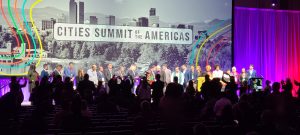City leaders from throughout the western hemisphere gathered in Denver last week to discuss challenges and make commitments regarding democracy, racism and climate change. As the city host, Denver Mayor Michael Hancock proclaimed that “cities are where the work happens” and heralded the event for helping to “make connections across the Americas.”
The City Summit of Americas attracted the mayors and hundreds of participants from Canada, the U.S. and Latin America. Prior to two-day summit, several mayors convened at a luncheon at which the keynote speaker was National Endowment for the Arts Chair Dr. Maria Rosario Jackson. “Artists and culture bearers can help us imagine the cities that we want,” said Jackson, adding that arts and culture are a critical part of the civic infrastructure “that allows us to care for each other.” Following Jackson’s comments, Mayor Jeni Arndt of Ft. Collins, CO, said that to “instill democracy we have to build trust. This is the heart of democracy—equity, inclusion and trust.”
Over the next two days, mayors from the Americas signed several agreements, including the Anti-Racist Cities Pact, Cities Forward (a sustainability agreement), and the Global Declaration of Mayors for Democracy, which “affirms an unwavering commitment by mayors across the hemisphere to promote democracy, free and fair elections, and defend the rule of law at all levels.” This latter agreement originated one year ago and has garnered the signatures of 20 cities to date.
Climate change was also a major focus of the Conference on World Affairs, which met in Boulder, CO, a few weeks ago. During a session on sustainability at the Cities Summit, mayors spoke of the importance of collaboration among cities across the hemisphere, partly to help share resources. As the Mayor of Rio de Janeiro, Eduardo da Costa Paes, said, “in contrast to U.S. cities, we in Latin America do not have the resources necessary to implement the climate measures we want, yet cities are fundamental to this effort.”
Beyond these issues, Mayor Hancock also raised the issue of homelessness. Mayor Victoria Woodards of Tacoma, WA, and chair of the National League of Cities, said that there is no community across the country that is not facing this issue, and that Tacoma can’t build enough shelter beds for all that need it. “How we solve homelessness is not shelters, it’s by building more affordable housing,” said Woodards.
During the summit session, Mayor Andre Dickens of Atlanta added that “we’ve become a victim of our own success, as more people come to Atlanta and the cost of living rises. It doesn’t do any good, though, to keep people in affordable housing for years; we need to get them into workforce development so that they can afford their own house.” Plus, he said, this workforce development needs to lead to a job that’s actually available. The mayor of Kingston, Jamaica, Delroy Williams, agreed, emphasizing that starting workforce development with homeless youth can be particularly helpful, since they are more “agreeable” to learn a trade.
Wrapping up, Mayor Dickens commented on the importance of sustainability efforts, saying that “we’re trying to create the cities not just for today, but of the future, which means that we need to have a future.” The City of Atlanta has worked on a variety of sustainability projects, including electrification, mass transit and more dense land use.
For more information on the Cities Summit visit their website here and for information on the Conference on World Affairs visit this https://www.colorado.edu/cwa/site.





